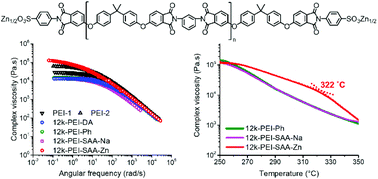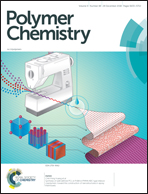Melt-processable telechelic poly(ether imide)s end-capped with zinc sulfonate salts†
Abstract
Charged telechelic poly(ether imide)s (PEIs) terminated with sodium, calcium, and zinc sulfonates were prepared by reacting dianhydride-terminated PEI (PEI-DA) oligomers with the respective sulfanilate salts. The thermal, tensile, and rheological properties of the charged PEIs were compared to the non-charged analogs including PEI-DA and phenyl-terminated PEIs (PEI-Ph), as well as high-molecular-weight (high-MW) commercial PEIs. All charged and non-charged PEIs were melt-processable and thermally stable up to ∼490 °C. After incorporating the charged end groups, the glass transition temperatures of the PEIs increased significantly. Among all PEIs with the charged end groups, zinc sulfonated PEI (PEI-SAA-Zn) exhibited the best melt stability and processability. PEI-SAA-Zn exhibited a pivot temperature in the range of ∼301–324 °C depending on the molecular weight. The viscosities of PEI-SAA-Zn oligomers decreased with temperature. The decreasing rate was more rapid above the pivot temperatures than below the pivot temperatures. Surprisingly, melt-pressed PEI-SAA-Zn with a low molecular weight of 12 kDa showed the best tensile strength, and the tensile properties were comparable to the state-of-the-art high-MW commercial PEIs. The findings herein provide insight into the design of high-performance polymers with enhanced mechanical and rheological properties.



 Please wait while we load your content...
Please wait while we load your content...